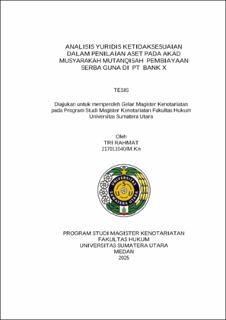Analisis Yuridis Ketidaksesuaian dalam Penilaian Aset pada Akad Musyarakah Mutanqisah Pembiayaan Serba Guna di PT Bank X
Legal Analysis of Non-Conformity in Asset Valuation in Musyarakah Mutanqisah Contract Pembiayaan Serba Guna at PT Bank X

Date
2025Author
Rahmat, Tri
Advisor(s)
Sembiring, Rosnidar
Barus, Utary Maharany
Metadata
Show full item recordAbstract
Banking institutions hold a crucial role in improving societal welfare. Article 2 of Law Number 21 of 2008 on Islamic Banking highlights that one of the primary aspects to consider in conducting Islamic banking activities is adherence to sharia principles. Under these principles, banks are prohibited from engaging in activities containing elements of maisir ( gambling), gharar (uncertainty) and riba (usury). PT Bank X is one of the Banks that operates a Sharia Business Unit. Among its products is sharia-based consumer financing, known as Multipurpose Financing, which is implemented using the Musyarakah Mutanaqisah contract. In practice, multi-purpose financing with a musyarakah mutanaqisah agreement still does not fully comply with the provisions National Sharia Council Fatwa. Based on this, the problems that will be studied in this thesis, Firstly, how to implement the musyarakah mutanaqisah agreement in multi-purpose financing. Second, what is the legal certainty if the musyarakah mutanaqisah agreement on Multipurpose Financing is made privately. Third, what are the legal consequences if there is a discrepancy in the implementation of the musyarakah mutanaqisah agreement made under the hand of Multipurpose Financing regarding the valuation of customer assets in accordance with the provisions National Sharia Council Fatwa.
This research adopts an normative legal research method with a descriptive approach. The study aims to examine the implementation of the musyarakah mutanaqisah contract in Multipurpose Financing and to analyze the legal implications arising from non-compliance in its application.
The implementation of musyarakah mutanaqisah financing contracts in practice reveals that the appraisal process (taqwim al-‘urudh) for the prospective customer’s assets is not conducted trough direct field varification. Instead, the appraisal is performed by the bank solely based on photocopies and images of the assets. In the provisions of Article 1 number 13 of the Islamic banking law in conjunction with Article 8 POJK 31/POJK/05/2014, it is stipulated that financing agreements must be made in writing. However, it does not regulate that provisions are made in the form of a deed under a tag or notarial deed. This indicates the contract object is intangible (nonexistent) at the time of signing. The object of a contract is one of its essential pillars, and one of its requirements is that it must exist siring the contract’s execution. The legal consequence of the absence of a contract object renders the contract null and void.
Collections
- Master Theses (Notary) [2330]
